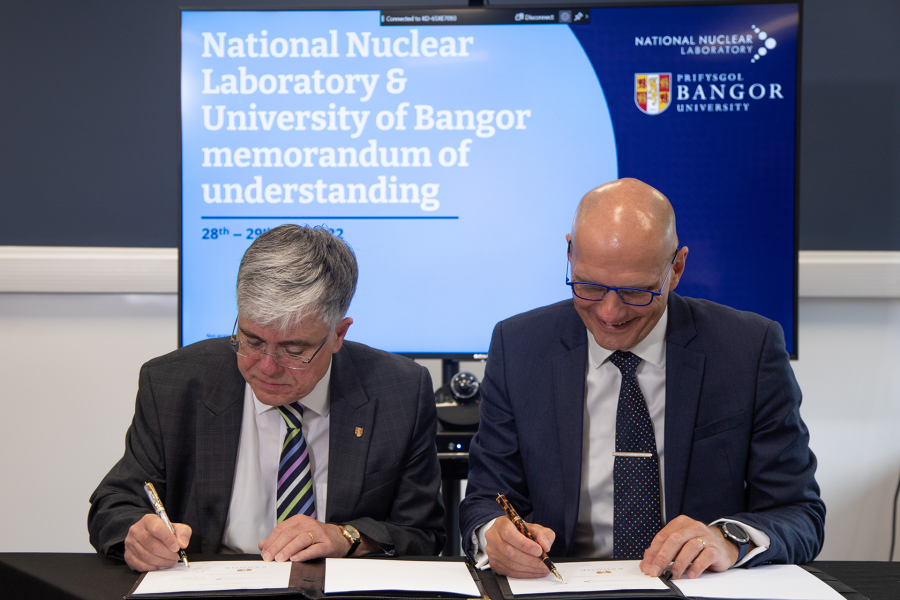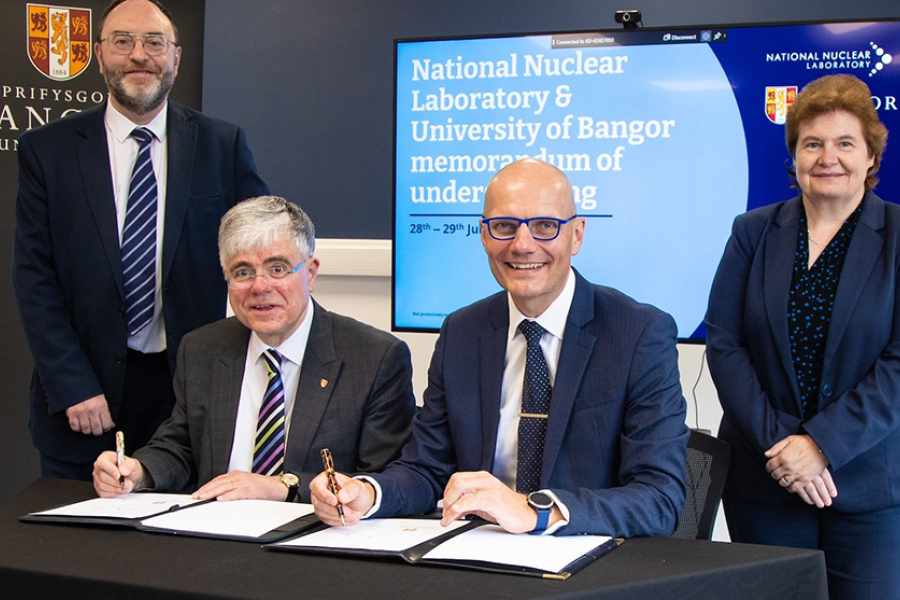Bangor University, and NNL, the UK's national laboratory for nuclear fission, have today signed a Memorandum of Understanding (MoU) that will see them work together to advance education and research in the field of nuclear energy, including skills and training for the nuclear industry. They will also work on joint research projects and share access to infrastructure, facilities and equipment that will advance nuclear technologies.
In recent years NNL’s investment in Wales has grown substantially with a series of partnerships with Welsh businesses and educational institutions, including Bangor University. This partnership demonstrates NNL’s commitment to driving up innovation, investment and employment of a skilled workforce in Wales – one that will be doing so much for the UK’s contribution to net zero.
The introduction of a new NNL office on Ynys Môn/Isle of Anglesey at Menai Science Park (M-Sparc) last year has provided a new, local base for NNL to take forward its ambitions in Wales and will help build the strong track record of Wales in nuclear technology.
Speaking at the signing of the MoU, Dr Paul Howarth, Chief Executive Officer of the National Nuclear Laboratory (NNL), said: “As we look to secure the UK’s clean energy future through more new and advanced nuclear technologies, we recognise the impact and value of Wales as a centre of nuclear science and innovation. The development of our existing relationship with Bangor University, formalised through the new MoU, demonstrates our commitment to driving the research, skills and capabilities that will be needed here and across the UK.
“The partnership will enable us to broaden and strengthen our joint capability in nuclear thermal hydraulics, new and innovative fuels, nuclear energy systems and co-generation. This work will play an important role in the UK’s ability to deliver on the next wave of low-carbon nuclear technologies, as well as supporting other advances for public benefit such as in transformative health and nuclear medicine. By harnessing both NNL’s and Bangor University’s world-leading facilities and capabilities, we will not only strengthen and maintain existing expertise in the nuclear sector but also ensure we have the people and skills for the UK’s new clear future.”

Professor Bill Lee, Director of the Nuclear Futures Institute added, “The NFI already collaborates with NNL in research into thermal hydraulics - reactor plumbing - and accident tolerant nuclear fuels. This MoU will enable us to expand into areas such as nuclear medicine, structural integrity, control and instrumentation and co-generation of hydrogen and jet-fuel from nuclear generated electricity. Furthermore, support from NNL for Bangor University’s new General Engineering undergraduate programme which is recruiting for 2023 entry will help train a new generation of engineers to underpin all low carbon technologies in North Wales.
“The UK Government’s vision for secure energy and Net Zero carbon emissions by 2050 will only be achieved by making use of key nuclear licensed sites such as Wylfa and Trawsfynydd. This MoU will support plans for Wales to use these sites for the UK’s clean energy future.”
Professor Iwan Davies, Vice-Chancellor of Bangor University added, “Our developing links with NNL sit well with our vision for Bangor University to be world-leading in the field of low carbon energy generation. The region already has extensive projects ongoing for marine tidal, offshore wind, solar, and hydrogen generation and our plans for Egni – a Low Carbon Energy Centre of Excellence funded through the North Wales Growth Deal will be strengthened by collaborations with leaders in nuclear technology such as NNL.”

Virginia Crosbie, Member of Parliament for Ynys Môn, said: “I am delighted at the signing of this MoU between Bangor University and the National Nuclear Laboratory. Our region has a strong nuclear heritage and this MoU will ensure that North Wales remains at the cutting edge of nuclear science. Such work will help advance medical science and our race to net zero by supporting projects such as new nuclear power plants at Wylfa on Ynys Môn.”
Rhun ap Iorwerth, Senedd Member for Ynys Môn added, “Research into new technologies for power generation is vital as we plan for a carbon-free future, and it’s important that we can benefit from that research locally. Through this agreement, Bangor University is showing its determination to play a prominent part in that.”




